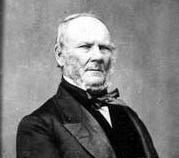Henry Grider
Henry Grider (born July 16, 1796 in Garrard County , Kentucky , † September 7, 1866 in Bowling Green , Kentucky) was an American politician . Between 1843 and 1847 and again from 1861 to 1866 he represented the state of Kentucky in the US House of Representatives .
Career
Henry Grider enjoyed a good education. After a subsequent law degree and his admission as a lawyer, he began to work in this profession in Bowling Green. During the British-American War of 1812 , he served as a soldier in the Kentucky Militia. In the 1820s he began a political career. In 1827 and 1831 he was elected to the Kentucky House of Representatives. Between 1833 and 1837 he was a member of the State Senate . He joined the Whig Party, founded in 1835 .
In the 1842 congressional election , Grider was elected to the United States House of Representatives in Washington, DC , in the third constituency of Kentucky , where he succeeded Joseph R. Underwood on March 4, 1843 . After a re-election in 1844, he was able to complete two terms in Congress until March 3, 1847 . The first was still dominated by the tension between President John Tyler and the Whigs. The second legislature of Grider was under the influence of the Mexican-American war . Henry Grider was an opponent of slavery . That cost him political support in slavery-friendly Kentucky in the late 1840s and 1850s.
In 1860 he was re-elected as a unionist for the third district in Congress. There he replaced Francis Bristow on March 4, 1861 . In the following two congressional elections, he was confirmed in his mandate, where he ran for the Democratic Party in 1864 . Henry Grider could remain in Congress until his death on September 7, 1866. His legislative periods since 1861 were marked by the civil war . After the war he was a member of the Reconstruction Committee. During his time in Congress, the 13th Amendment to the Constitution was ratified in 1865 , prohibiting slavery. Grider was also involved in drafting the 14th Amendment , which extended civil rights to include former slaves. However, this addition did not come into force until 1870.
Web links
- Henry Grider in the Biographical Directory of the United States Congress (English)
- Henry Grider in the database of Find a Grave (English)
| personal data | |
|---|---|
| SURNAME | Grider, Henry |
| BRIEF DESCRIPTION | American politician |
| DATE OF BIRTH | July 16, 1796 |
| PLACE OF BIRTH | Garrard County , Kentucky |
| DATE OF DEATH | September 7, 1866 |
| Place of death | Bowling Green , Kentucky |

